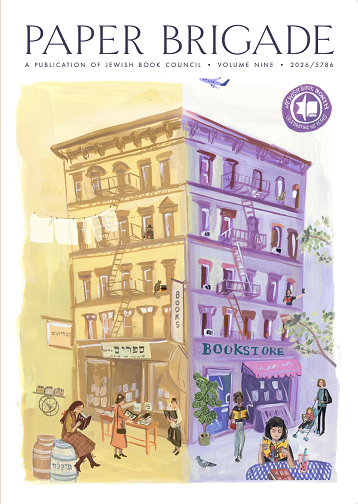
Paper Brigade Volume 9
A celebration of Jewish Book Council’s roots one hundred years ago, the ninth issue of Paper Brigade features a tribute to Fanny Goldstein, the librarian who founded Jewish Book Month; cover art by Jenny Kroik, a beautifully illustrated map of Jewish libraries around the world; John Irving on the Jewish protagonist of the sequel to The Cider House Rules, short fiction about Jewish summer camp and a hotel haunted by victims of October 7th; two contemporary authors on rewriting Fagin, the villain of Charles Dickens’s Oliver Twist; an excerpt from a gorgeous cookbook by Beejhy Barhany; poetry, illustrations, photography, and more.
At checkout, you will be given the option to add an electronic gift note to this order.
A Note from Naomi Firestone-Teeter, Jewish Book Council’s CEO
From organizing Jewish Book Month in our earliest days, to developing and leading our wide-ranging programs today, Jewish Book Council has worked to ensure that Jewish stories are read, celebrated, and passed down from generation to generation. Each year, JBC sends hundreds of authors to communities across North America, supports emerging writers, administers the National Jewish Book Awards, and publishes Paper Brigade. Through these and other efforts, we strengthen Jewish identity, foster dialogue, and highlight the breadth of the Jewish experience.
As we enter the centennial of Jewish Book Month, this work feels more urgent than ever. Jewish writers continue to face challenges in the publishing industry, and Jewish stories need champions. JBC exists to be that champion and empower others across our community. By nurturing the careers of Jewish authors and creating spaces for meaningful conversations around their books, we help safeguard the presence of Jewish voices in the broader cultural landscape.
In this issue, you’ll learn about JBC’s past, and also its future. We just launched yet another initiative: Nu Reads, a bi-monthly book subscription series that includes signed books, a printed companion with a personal letter from the author, interviews, and discussion prompts, special extras, and invitations to exclusive events. By curating Jewish books and delivering them directly to readers, and by offering opportunities to gather around them, we are investing not only in individual works but in the ecosystem that sustains Jewish literature.
As I reflect on Jewish Book Council’s history, I am inspired by the resilience and creativity of Jewish writers past and present. Looking ahead, I am proud that JBC will continue to stand beside them — and alongside readers like you — as we write the next chapter together.
A Note from Becca Kantor, Jewish Book Council’s Editorial Director
One hundred years ago, the head librarian of the Boston Public Library’s West End Branch — a young Russian immigrant named Fanny Goldstein — founded Jewish Book Week. In time, Jewish Book Week became Jewish Book Month, organized by Jewish Book Council.
This issue of Paper Brigade pays tribute to the woman behind JBC. An excerpt from Richard Michelson’s new children’s book, Fanny’s Big Idea, depicts the events leading up to Goldstein’s first exhibit of Jewish books. Interviews highlight contemporary figures — Aaron Lansky, founder of the Yiddish Book Center; and Raquel Ukeles, head librarian of the National Library of Israel — who follow in Goldstein’s footsteps by preserving Jewish literature for others. Modern-day Jewish immigrant stories are told in essays by Zeeva Bukai and Esther Chehebar, and in “My Journey from Ethiopia to Harlem,” an excerpt from a gorgeous cookbook by Beejhy Barhany. This year’s literary map shows Jewish libraries around the world.
Goldstein was a lifelong activist, and here we highlight the causes she championed. As the Nazis rose to power, Goldstein wrote about the dangers of antisemitism. In “Commentary on Fanny Goldstein’s ‘Autos-da-fe for the Jew and His Book,’” historian Pamela S. Nadell examines the distressing parallels between Goldstein’s time and today. Nancy Churnin and Allison Epstein discuss how they counter antisemitic stereotypes through literature in “Rewriting Fagin.”
In addition to Jewish Book Week, Goldstein arranged events to celebrate the literature of other minority groups. Her belief in interfaith collaboration is echoed in Kyra Lisse’s poem “A Blessing,” and in two true stories of Jewish Americans who helped Japanese Americans imprisoned in US concentration camps. Goldstein’s work with prisoners was grounded in her belief in redemption and in forgiveness — a concept explored in Tova Mirvis’s essay “Forensics, Fiction, and Forgiveness: Crafting a Mystery Novel.”
We see this issue of Paper Brigade– — like the table of Jewish books Fanny Goldstein lovingly displayed in her library’s lobby a century ago — as a small representation of the millions of Jewish stories in the world. I hope it entertains and inspires you.